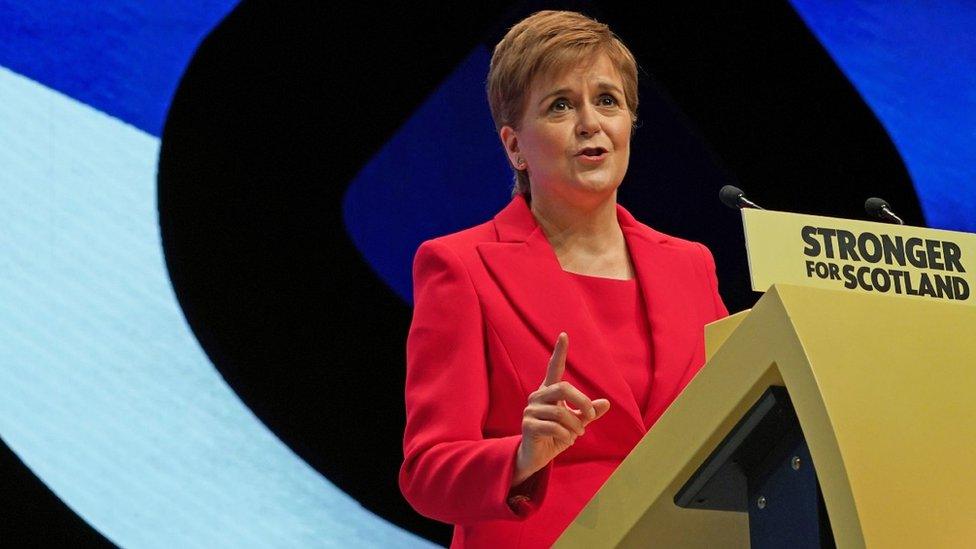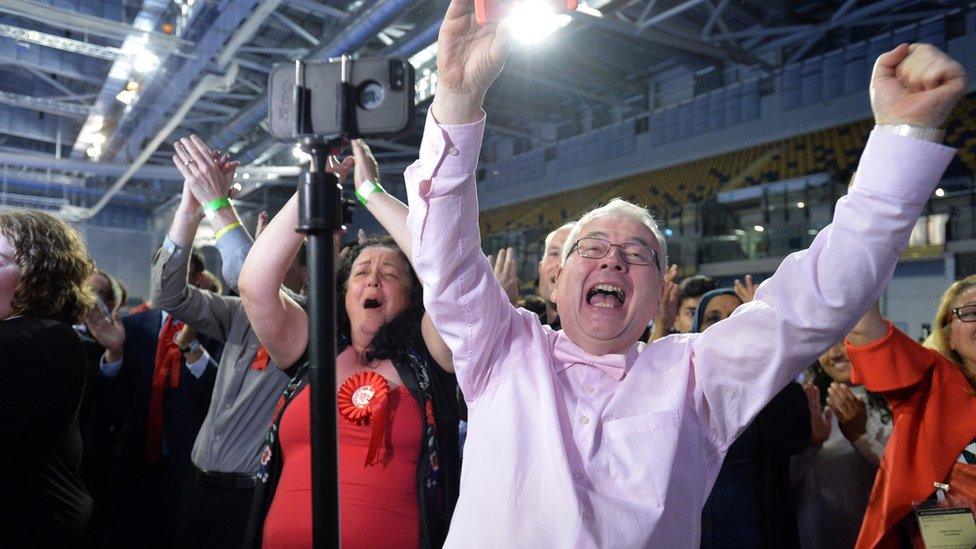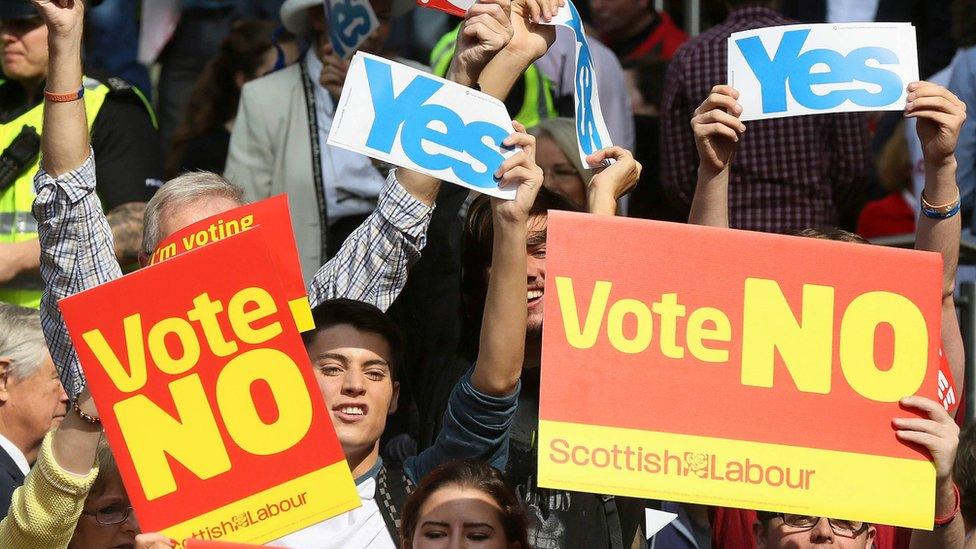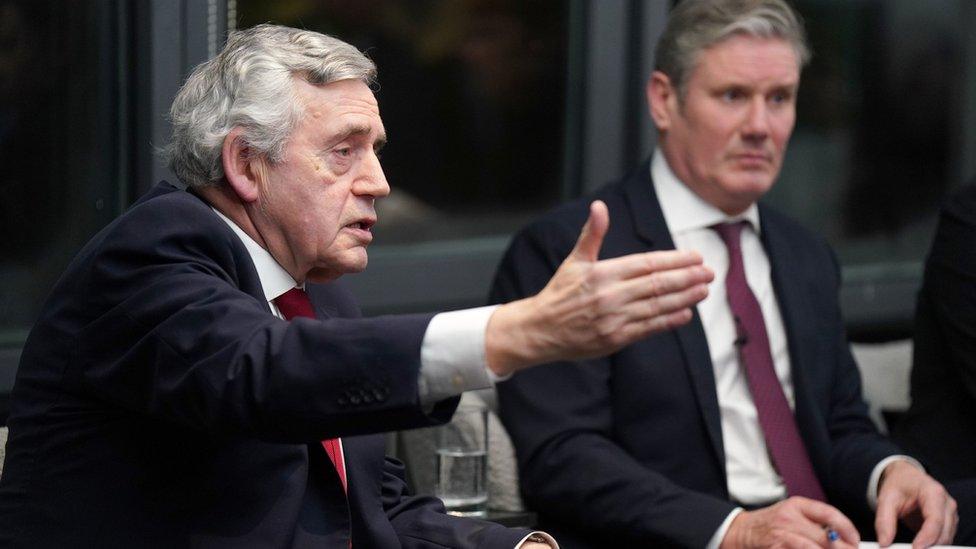Can Labour revive its fortunes in Scotland?
- Published

The report by Gordon Brown contains a series of proposals
Labour has outlined proposals for a series of constitutional reforms aimed in part at reviving the party's fortunes in Scotland.
Former Prime Minister Gordon Brown says the ground on which the battle is fought in Scotland "is changing forever", and that his party offers a fresh route through the debate over independence.
But is that true? Can Labour find a "third way" over a binary question? Does the party really need to win in Scotland to retake power - and how likely is that?
What's this all about?

Labour is looking to the next general election, crafting a platform that it hopes can win back power - by promising to spread that power out around the country.
Many of the proposals laid out in a report by Gordon Brown are about reforming Westminster, such as by replacing the House of Lords, or by strengthening devolution to different regions of England.
When it comes to Scotland, and indeed Wales and Northern Ireland, the biggest reforms of devolution have already happened - driven by a Labour government, as party leader Sir Keir Starmer is keen to stress.
But it means there are not many big-ticket items left to promise. Perhaps the headline measure promised for Scotland is a more explicit devolved veto over Westminster lawmaking which crosses into devolved areas.
This is potentially a significant development which would better allow Holyrood to push back on things like Brexit, but it is still fairly niche stuff.
The same goes for ideas like extra legal protection for MSPs to speak out in parliament and a consultation on raising the ceiling for Holyrood's capital borrowing.
The hope is that the overall package and the broad promise of a reformed UK is a compelling alternative to what the other parties are pitching - independence under the SNP, or the status quo under the Conservatives.
A 'de facto referendum'?

First Minister Nicola Sturgeon wants the next election to be a de facto referendum on independence
With plans for an independence referendum in October 2023 having hit the buffers, First Minister Nicola Sturgeon has suggested she will use the next election as a single-issue poll on the constitutional issue.
The prospect of such a campaign makes it particularly important for Labour to have a convincing and consistent policy to pitch on the doorsteps.
This needs to be a broader proposition than just taking a side on the binary issue of independence. Labour needs to regain votes lost to both ends of the constitutional spectrum since the 2014 referendum, with the SNP and Tories having mopped up support as the parties of Yes and No.
And the party hopes its devolution-plus proposal means it will be able to talk about all kinds of other things during the campaign. Mr Brown highlighted the health service, youth employment, housing and living standards as particular examples.
The SNP would not ignore such issues even if it did run on a one-line manifesto, of course. It's just that the party's answer would be that all of them could be enhanced using the powers of independence.
Labour's plan is to find a position that it can sell as less of a gamble than leaving the UK, but still a convincing step up from how things stand now.
And if they can pull it off, the prize for them would be twofold - in that it could kybosh the SNP's drive for independence at the same time as helping to retake Downing Street.
The SNP are clearly alive to the potential challenge a Labour revival would pose to their project. That's why they are already painting their red rivals as a Tory-lite midwife of Brexit, hoping to find an attack line that sticks ahead of the big electoral test.
Does Labour need Scotland?

The proposals were unveiled by Gordon Brown, Sir Keir Starmer and Scottish party leader Anas Sarwar
Labour leaders often say they need to win in Scotland again if they are to win back power. But are they right?
Certainly, the party's spell in the wilderness of Westminster opposition has coincided with a collapse in representation north of the border, with a single Scottish Labour MP clinging on compared to the scores returned in years gone by.
But because its former dominance has been supplanted by the SNP, Nicola Sturgeon's party has traded on the idea that this doesn't affect the balance at Westminster - because SNP MPs would not vote for a Conservative prime minster.
That way they can continue to pitch themselves as the core anti-Tory vote north of the border, and could even end up in an influential position in a hung parliament.
That is a prospect already being weaponised in Conservative campaigning, which is why Sir Keir has taken such a firm line on there being "no deals" with the SNP.
Of course, he would far rather win a majority on his own, without having to rely on support from any other party.
And given their recent history and enmity, trust is not at an all-time high between Labour and the SNP.
The SNP has not always been as fervently anti-Tory as it is now; the parties routinely did budget deals when the SNP first took power at Holyrood, when they shared an enjoyment of giving Labour a bloody nose.
And some students of Labour history still mutter about 1979, when the SNP's 11 MPs went through the voting lobbies with the Conservatives to hasten the demise of James Callaghan's government.
So there is more politics to this than the bare numbers might suggest.
Is Labour really poised to regain ground?

There is not a huge list of obvious targets for Labour in Scotland
The party's UK-wide polling has been strong in the wake of a Conservative meltdown which claimed the careers of two prime ministers in two months.
But when we do eventually get to an election, Labour does not have a huge list of obvious target seats in Scotland.
There are four constituencies with SNP majorities of under 10% where Labour was the runner up last time out - and oddly enough, in three of them the sitting MP has since left the party.
Two defected to Alba (Kirkcaldy and Cowdenbeath, SNP majority 2.6%; and East Lothian, SNP majority 6.6%), while the member for Rutherglen and Hamilton West (SNP majority 9.7%) was found guilty of breaching Covid regulations.
The other realistic target is Glasgow North East, an SNP majority of 7.5% - which has technically changed hands at every election since 2005, when it was held by the Commons Speaker Michael Martin.
Every other constituency that Labour might be looking at has a double-digit majority. Coatbridge, Chryston and Bellshill is the next most marginal, at 11.7%.
And they are not close to challenging in any of the seats held by the Conservatives, all of which are straight fights between the SNP and Tories.
There are more possibilities when you look to the 2017 polls, when there were 26 seats where Labour was within relative touching distance of the SNP, including four which it won and six where the SNP majority was under 2%.
Does any of this matter?

As it stands, it might be fair to conclude that Labour's revival in the polls has more to do with Tory troubles than bold new policy ideas.
This paper has been in the pipeline for almost two years, and doesn't include much that's particularly new or surprising. Getting rid of the Lords would be a big step, but reform of that institution has been chewed over for years.
That doesn't mean this kind of announcement isn't important, though. Sir Keir knows his party needs substance to its platform, and in Scotland the constitution is an absolutely key part of that.
In the elections since the 2014 referendum, the SNP has campaigned as the party of Yes to independence, the Tories as the party of No, and Labour as the party of "wouldn't you rather talk about something else"?
That may persist in some ways. The party's position may well still be that other topics are more worthy of attention, and indeed it may be that they prove more compelling for the electorate next time around.
But in trying to carve out a particular position of their own, Labour are now seeking to play an active role in the constitutional debate rather than duck it altogether.
- Published5 December 2022
